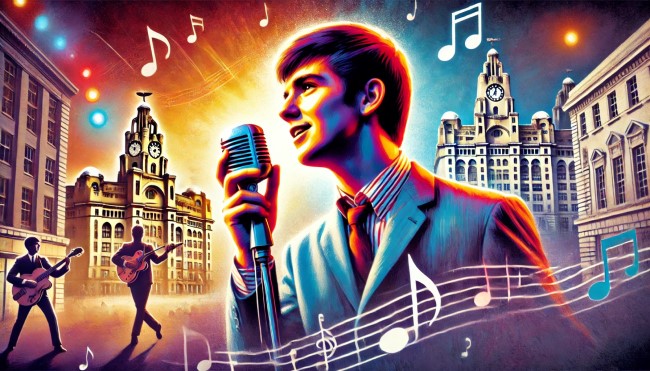Leader of the Pacemakers in 1960s Pop: Gerry Marsden’s Iconic Role in Music History

The 1960s were a pivotal era in the development of modern pop and rock music. As the British Invasion took over the world, Liverpool emerged as a hub of musical innovation, spearheaded by bands like The Beatles and Gerry and the Pacemakers. While The Beatles achieved unprecedented global fame, another group from the same city was making waves of their own. The leader of the Pacemakers in 1960s pop, Gerry Marsden, played a crucial role in shaping the sound and culture of that decade. His influence extended beyond the charts, leaving a legacy that still resonates today.
Gerry Marsden: The Heart of the Pacemakers
Early Life and Formation of the Band
Born in 1942 in Liverpool, England, Gerry Marsden grew up surrounded by the burgeoning rock ‘n’ roll scene. Inspired by the likes of Elvis Presley and skiffle music, he quickly gravitated toward the guitar and singing. By 1956, Marsden had formed a band with his brother Fred Marsden (drums), Les Chadwick (bass), and Arthur McMahon (piano). They initially played local clubs and dance halls, gaining popularity in the vibrant Liverpool music scene.
By the time the 1960s arrived, the band had become known as Gerry and the Pacemakers, and they caught the attention of local music manager Brian Epstein. Epstein, already managing The Beatles, saw great potential in the Pacemakers and quickly signed them to his roster.
The Role of Brian Epstein and George Martin
The success of Gerry and the Pacemakers can be partially attributed to their association with two of the most influential figures in the music industry at the time: Brian Epstein and producer George Martin. Epstein’s keen eye for talent and Martin’s production prowess helped the band create a polished, radio-friendly sound that resonated with audiences both in the UK and abroad. Their first single, “How Do You Do It?”, reached number one on the UK charts, a feat they would repeat with their next two singles, “I Like It” and “You’ll Never Walk Alone.”
The Unique Sound of the Pacemakers
While comparisons with The Beatles were inevitable, Gerry and the Pacemakers carved out their own identity in the Merseybeat scene. Their music was characterized by upbeat rhythms, catchy melodies, and Marsden’s distinctive voice. Marsden’s leadership and charisma set them apart, and their songs often had a more light-hearted, feel-good vibe than the increasingly experimental works of their Liverpool counterparts.
Chart Success and Cultural Impact
In 1963, Gerry and the Pacemakers made history by becoming the first band to have their first three singles hit number one on the UK charts. This achievement cemented their place in music history and set them up for a successful international career. Their version of “You’ll Never Walk Alone,” originally from the musical Carousel, became an anthem for Liverpool Football Club, further embedding them in the cultural fabric of the city.
Their music resonated not only in the UK but also in the United States, where they toured with The Beatles and appeared on popular television shows such as The Ed Sullivan Show. Their song “Don’t Let the Sun Catch You Crying” became a major hit in the US, reaching number four on the Billboard Hot 100 in 1964.
The Decline of the Pacemakers and Marsden’s Continued Legacy
The Decline of Popularity
As the 1960s progressed, rock music began to evolve. Bands like The Beatles and The Rolling Stones experimented with new sounds, moving away from the more straightforward pop of the early 1960s. Unfortunately, Gerry and the Pacemakers were unable to keep pace with these changes. Despite their initial success, their popularity waned, and they disbanded in 1967.
However, the legacy of their early hits endured, particularly “You’ll Never Walk Alone,” which continued to be played at Liverpool FC matches and became a symbol of solidarity and resilience. Even as other bands of the era faded into obscurity, Gerry and the Pacemakers retained a loyal following.
Reunions and Charity Work
In the 1970s, Gerry Marsden reformed the Pacemakers, and they continued to perform on the oldies circuit, enjoying steady success with nostalgic audiences. Marsden became a beloved figure in Liverpool, known not only for his musical contributions but also for his charity work. Following the Hillsborough disaster in 1989, Marsden re-recorded “You’ll Never Walk Alone” with a group of fellow musicians, including Paul McCartney, to raise funds for the victims’ families. The song once again topped the UK charts, showing that Marsden’s impact extended far beyond the world of pop music.
A Respected Career
Though Gerry and the Pacemakers never achieved the same level of global superstardom as The Beatles, they were highly respected within the industry. Gerry Marsden was awarded the MBE (Member of the Order of the British Empire) in 2003 for his charitable efforts, and he was given the Freedom of the City of Liverpool in recognition of his contributions to the city’s cultural heritage.
Marsden continued to perform well into his later years, remaining a fixture in British popular culture. In 2021, Marsden passed away, but his music and the spirit of the 1960s Merseybeat sound lived on.
The Influence of the Pacemakers on 1960s Pop
Merseybeat: A Defining Sound
The Merseybeat sound, which emerged from Liverpool in the early 1960s, was characterized by its infectious rhythms and harmonies. It was a precursor to the more experimental forms of rock and pop that would emerge later in the decade. Gerry and the Pacemakers, along with The Beatles, were at the forefront of this movement, helping to popularize it not just in the UK but worldwide. Their catchy, upbeat songs captured the optimism and youthful energy of the time, making them favorites among the teen audience.
A Rivalry with The Beatles
While The Beatles eventually overshadowed Gerry and the Pacemakers, there was a time in the early 1960s when the two bands were considered equals. Both hailed from Liverpool, both were managed by Brian Epstein, and both recorded with George Martin. This friendly rivalry pushed both bands to improve their craft, and it’s likely that without this competition, the music of the 1960s would have taken a very different form.
The Lasting Impact of “You’ll Never Walk Alone”
Though their chart success was relatively short-lived, the cultural impact of Gerry and the Pacemakers is undeniable. “You’ll Never Walk Alone,” in particular, has become an enduring symbol of hope and unity. It has been adopted by sports teams around the world, but nowhere is it more closely associated than with Liverpool Football Club. For many, the song is inseparable from the identity of the city itself, and its association with moments of tragedy and triumph has given it a timeless quality.
Conclusion
The leader of the Pacemakers in 1960s pop, Gerry Marsden, played a pivotal role in shaping the music of his era. Though his band’s time at the top of the charts was brief, their influence endures to this day. Marsden’s voice, charisma, and leadership helped define the sound of Merseybeat, and his contributions to pop culture have left an indelible mark on both music and society. From the Liverpool docks to stadiums around the world, the music of Gerry and the Pacemakers continues to inspire and uplift, ensuring that Marsden’s legacy will never walk alone.



